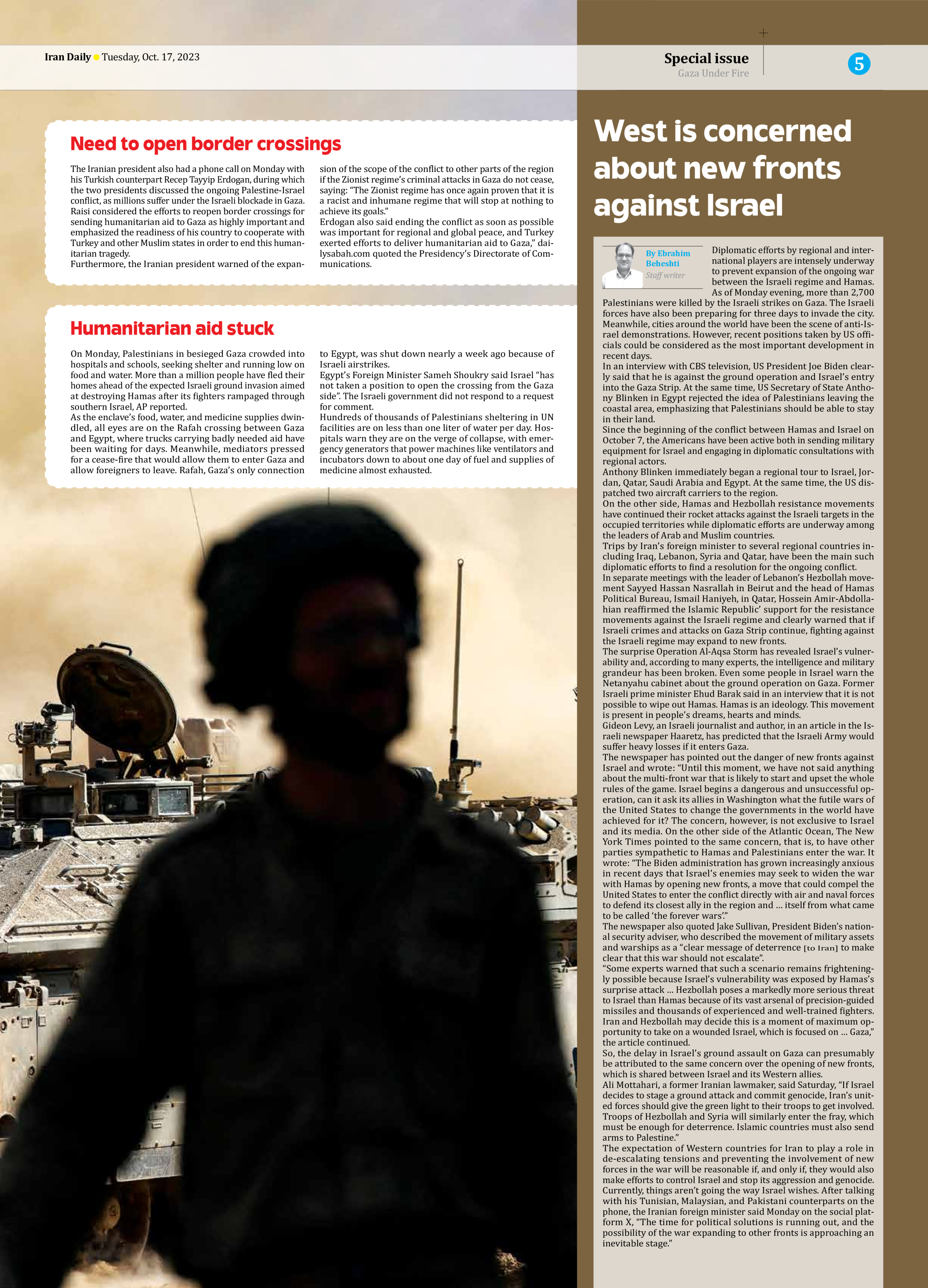
West is concerned about new fronts against Israel
By Ebrahim Beheshti
Staff writer
Diplomatic efforts by regional and international players are intensely underway to prevent expansion of the ongoing war between the Israeli regime and Hamas. As of Monday evening, more than 2,700 Palestinians were killed by the Israeli strikes on Gaza. The Israeli forces have also been preparing for three days to invade the city. Meanwhile, cities around the world have been the scene of anti-Israel demonstrations. However, recent positions taken by US officials could be considered as the most important development in recent days.
In an interview with CBS television, US President Joe Biden clearly said that he is against the ground operation and Israel’s entry into the Gaza Strip. At the same time, US Secretary of State Anthony Blinken in Egypt rejected the idea of Palestinians leaving the coastal area, emphasizing that Palestinians should be able to stay in their land.
Since the beginning of the conflict between Hamas and Israel on October 7, the Americans have been active both in sending military equipment for Israel and engaging in diplomatic consultations with regional actors.
Anthony Blinken immediately began a regional tour to Israel, Jordan, Qatar, Saudi Arabia and Egypt. At the same time, the US dispatched two aircraft carriers to the region.
On the other side, Hamas and Hezbollah resistance movements have continued their rocket attacks against the Israeli targets in the occupied territories while diplomatic efforts are underway among the leaders of Arab and Muslim countries.
Trips by Iran’s foreign minister to several regional countries including Iraq, Lebanon, Syria and Qatar, have been the main such diplomatic efforts to find a resolution for the ongoing conflict.
In separate meetings with the leader of Lebanon’s Hezbollah movement Sayyed Hassan Nasrallah in Beirut and the head of Hamas Political Bureau, Ismail Haniyeh, in Qatar, Hossein Amir-Abdollahian reaffirmed the Islamic Republic’ support for the resistance movements against the Israeli regime and clearly warned that if Israeli crimes and attacks on Gaza Strip continue, fighting against the Israeli regime may expand to new fronts.
The surprise Operation Al-Aqsa Storm has revealed Israel’s vulnerability and, according to many experts, the intelligence and military grandeur has been broken. Even some people in Israel warn the Netanyahu cabinet about the ground operation on Gaza. Former Israeli prime minister Ehud Barak said in an interview that it is not possible to wipe out Hamas. Hamas is an ideology. This movement is present in people’s dreams, hearts and minds.
Gideon Levy, an Israeli journalist and author, in an article in the Israeli newspaper Haaretz, has predicted that the Israeli Army would suffer heavy losses if it enters Gaza.
The newspaper has pointed out the danger of new fronts against Israel and wrote: “Until this moment, we have not said anything about the multi-front war that is likely to start and upset the whole rules of the game. Israel begins a dangerous and unsuccessful operation, can it ask its allies in Washington what the futile wars of the United States to change the governments in the world have achieved for it? The concern, however, is not exclusive to Israel and its media. On the other side of the Atlantic Ocean, The New York Times pointed to the same concern, that is, to have other parties sympathetic to Hamas and Palestinians enter the war. It wrote: “The Biden administration has grown increasingly anxious in recent days that Israel’s enemies may seek to widen the war with Hamas by opening new fronts, a move that could compel the United States to enter the conflict directly with air and naval forces to defend its closest ally in the region and … itself from what came to be called ‘the forever wars’.”
The newspaper also quoted Jake Sullivan, President Biden’s national security adviser, who described the movement of military assets and warships as a “clear message of deterrence [to Iran] to make clear that this war should not escalate”.
“Some experts warned that such a scenario remains frighteningly possible because Israel’s vulnerability was exposed by Hamas’s surprise attack … Hezbollah poses a markedly more serious threat to Israel than Hamas because of its vast arsenal of precision-guided missiles and thousands of experienced and well-trained fighters. Iran and Hezbollah may decide this is a moment of maximum opportunity to take on a wounded Israel, which is focused on … Gaza,” the article continued.
So, the delay in Israel’s ground assault on Gaza can presumably be attributed to the same concern over the opening of new fronts, which is shared between Israel and its Western allies.
Ali Mottahari, a former Iranian lawmaker, said Saturday, “If Israel decides to stage a ground attack and commit genocide, Iran’s united forces should give the green light to their troops to get involved. Troops of Hezbollah and Syria will similarly enter the fray, which must be enough for deterrence. Islamic countries must also send arms to Palestine.”
The expectation of Western countries for Iran to play a role in de-escalating tensions and preventing the involvement of new forces in the war will be reasonable if, and only if, they would also make efforts to control Israel and stop its aggression and genocide.
Currently, things aren’t going the way Israel wishes. After talking with his Tunisian, Malaysian, and Pakistani counterparts on the phone, the Iranian foreign minister said Monday on the social platform X, “The time for political solutions is running out, and the possibility of the war expanding to other fronts is approaching an inevitable stage.”







